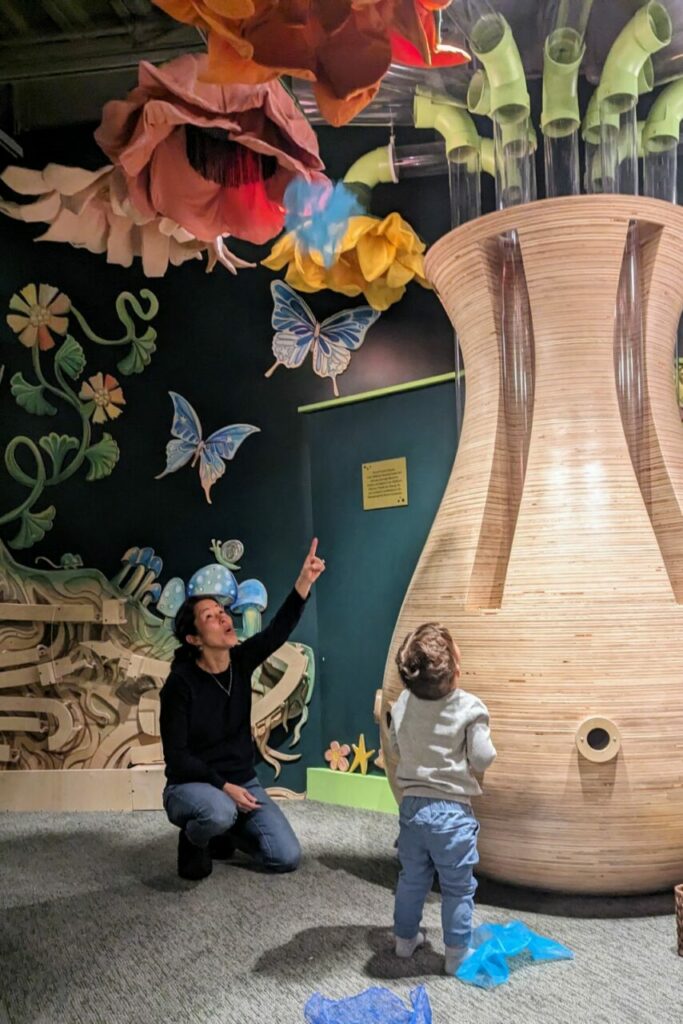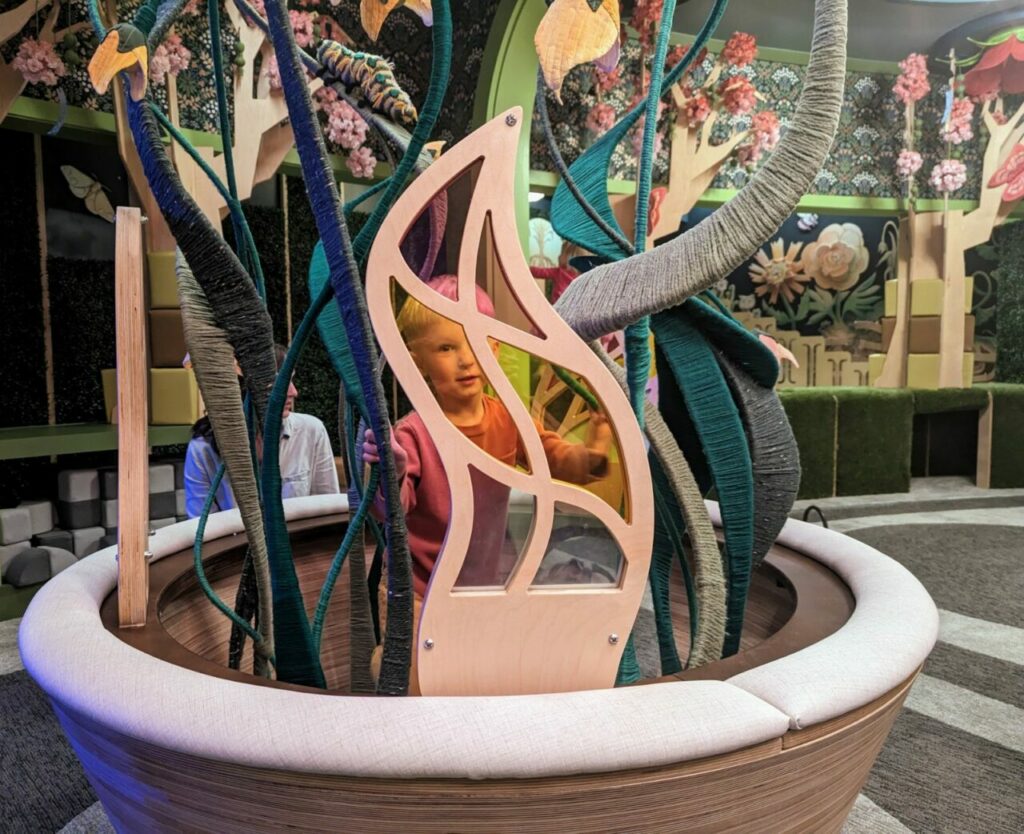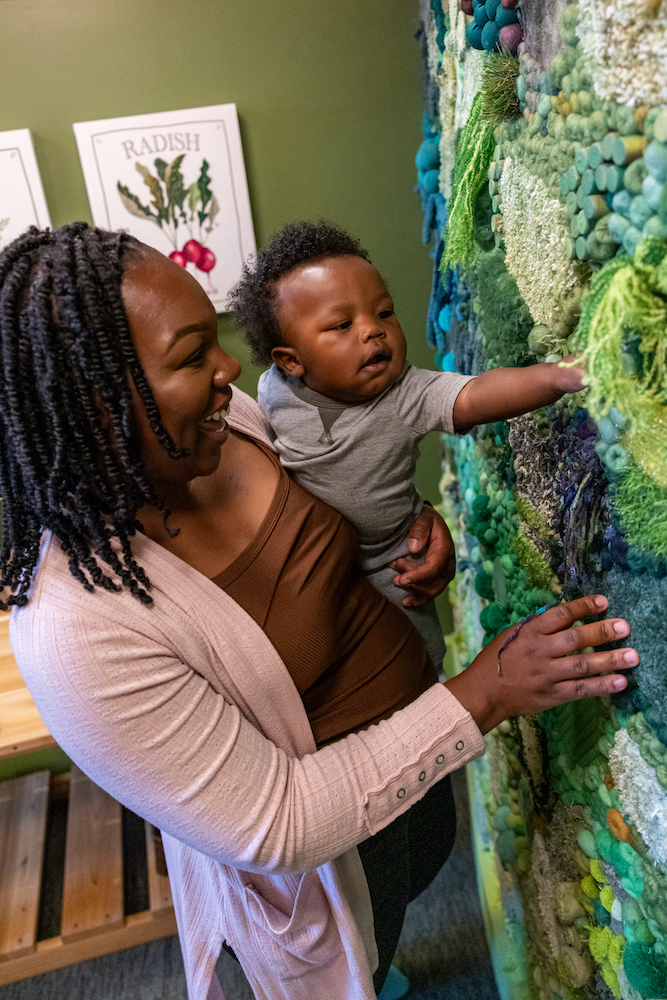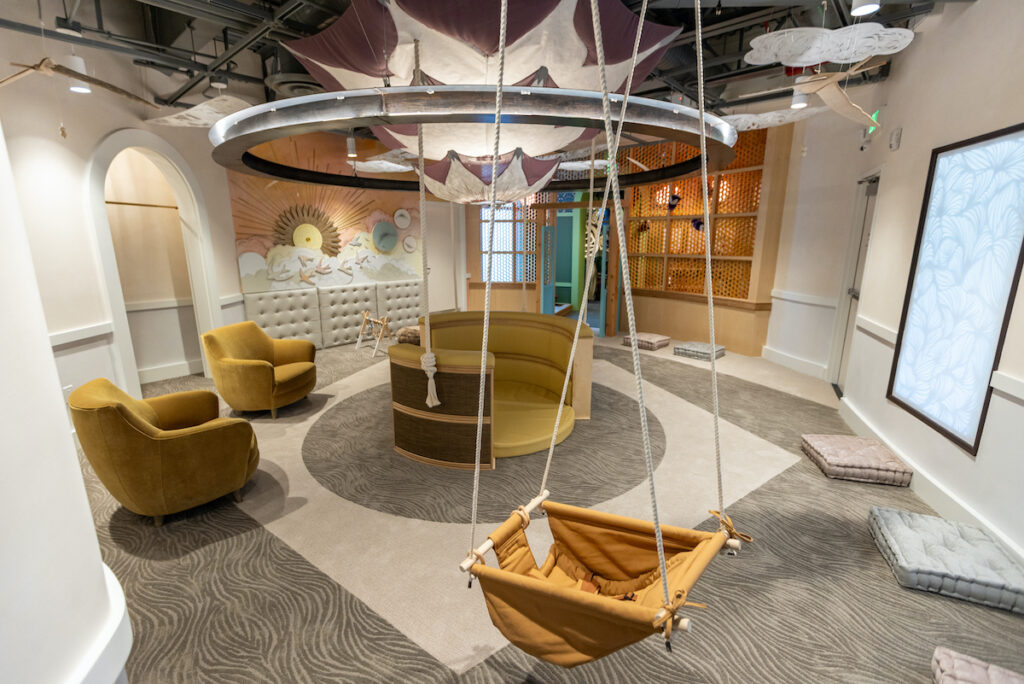Littlest Sprouts Bloom Year-Round
57 0
By Kathryn White
Bloom, a new interactive exhibit for newborns and toddlers, opened Oct. 16 at the Children’s Museum of Denver.
The nature-inspired space features details designed to promote many types of learning and play: sensory, constructive, physical, social and imaginative.
“When we set out to design this experience, we took a hard look at the latest research on the different types of play and their role in the cognitive, emotional and physical development for early learners,” said Museum President and CEO Mike Yankovich. “Based on what we learned, we designed Bloom to promote adult-child interaction as well as the curiosity, exploration and empowerment of the museum’s youngest visitors.”
 Toddlers feed colorful scarves into this feature, then watch to see where the scarves rain down from. Photo courtesy of Children’s Museum of Denver
Toddlers feed colorful scarves into this feature, then watch to see where the scarves rain down from. Photo courtesy of Children’s Museum of Denver
Toddlers enjoy an exhibit favorite, the scarf blower (or scarf tree), situated just inside the entrance. They experiment with cause and effect as they feed brightly colored scarves into holes built into a large tree trunk. A light suction takes the scarf out of sight into the trunk. Then, they watch — or wonder — as scarves reappear above to travel through plexiglass tubes and drop from overhead “flowers” back into the room.
Adventuring from there, little ones can launch soft balls along an interactive wall, climb or toddle up turf-covered steps to a soft slide or crawl through a cave-like tunnel.
 Smart glass transports the age-old peek-a-boo game into the modern era. Photo courtesy of Children’s Museum of Denver
Smart glass transports the age-old peek-a-boo game into the modern era. Photo courtesy of Children’s Museum of Denver
A smart glass peek-a-boo potted plant and other Bloom features encourage adults to initiate what the National Institute for Play (NIFP) calls the most valuable aspect of play caregivers can practice with infants: attunement.
“As they gaze into each other’s eyes,” states the NIFP website, “the baby radiates an involuntary but compelling smile and the parent automatically smiles back, feeling a surge of verbal and bodily joyfulness. The baby usually makes little sounds, a babble or light gurgling laughter, and the parent responds in a rhythmic, sing-song voice — the universal nonsense language of baby-talk. This is a phenomenon seen across all cultures around the globe.
“This experience is the most basic state of play,” states NIFP, “and it becomes a foundation for the much more complex play states that we engage in throughout life.”
Attunement opportunities abound at Bloom as young learners and their caregivers explore elements of light and sound, delight together in an imaginative fairy garden, and activate sensory delights along a “moss” wall perfect for investigating color and texture.
 Moss wall activates sensory exploration. Photo courtesy of Children’s Museum of Denver
Moss wall activates sensory exploration. Photo courtesy of Children’s Museum of Denver
“We wanted art and beauty layered into the entire exhibit, not just something that hung on the walls. We worked with four different artists and numerous craftsmen who designed in tandem to bring the museum’s vision for Bloom to life,” said Kerri Atter, director of special projects, “I like to think of it as a meadow; all the pieces flow together, but as you look closer, you see all the individual details that make Bloom a truly magical world.”
Caregiver-friendly amenities border the exhibit’s quietest space at the far end of the exhibit, the area devoted to infants. Amenities include an alcove equipped for changing diapers and washing hands, a station with bottle warmers, and two cushioned nooks for breast- and bottle-feeding. Here, babies can settle into tummy time in the infant space’s hot-air balloon. Board books are on hand as well.
 The infant area features a whimsical tummy-time hot-air balloon and caregiver-friendly amenities. Photo courtesy of Children’s Museum of Denver
The infant area features a whimsical tummy-time hot-air balloon and caregiver-friendly amenities. Photo courtesy of Children’s Museum of Denver
The exhibit took longer than expected to pull together, said staff. Work started before the pandemic hit. And then a torrential rain caused flooding in the space. When Bloom was finally ready for the public in mid-October, the long list of people who contributed to its creation — staff, board members and donors, designers, artists and construction crews — could add perseverance to the list of reasons to celebrate.
“The museum leaders are quite impressive, kind and have engaged a talented community of supporters,” said board member Judy Pottle at the exhibit’s opening event. “Together, with you, we have created an enriching space to be proud of for the next generation to fully blossom.”
For those forever in love with the museum’s former space dedicated to its youngest visitors, there is a cleverly hidden homage within the walls of Bloom.
Bloom is intended for the museum’s youngest visitors, those up to 3 years old. Older siblings are welcome to join caregivers in enjoying the space and guiding a younger visitor’s experience.
Children’s Museum of Denver is open daily from 9 a.m. to 4 p.m. at 2121 Children’s Museum Dr.. Memberships and one-day tickets are available, as are discounts for those age 60 and over, military, groups of 10 or more and anyone receiving SNAP benefits. For details visit https://www.mychildsmuseum.org/visit.
Link to original article